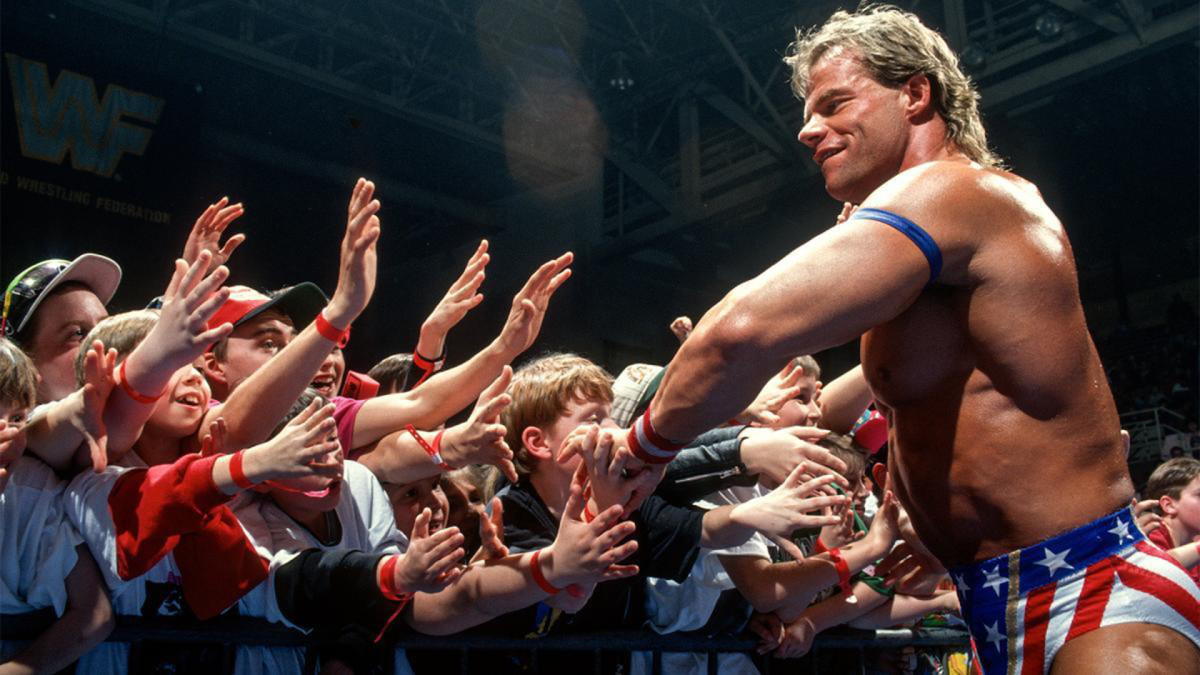‘WWE Icons’ Explores the Triumphs and Tragedies of Lex Luger
Larry Pfohl always wanted to become a star. He ultimately accomplished—and even exceeded—that goal in pro wrestling as Lex Luger, a true icon of the business.
But he paid a price for fame.
Pfohl transformed into Luger, who will forever remain an integral piece of wrestling history thanks to his work in the 1990s. His story is examined in depth in the newest installment of the WWE Icons docuseries, which debuts this weekend on Peacock. Directed by Kieran Bent, it is an outstanding 84-minute look at Luger’s wrestling career, as well as a deep exploration of the failures in his personal life.
In the end the story is one of redemption. Luger has made enough of a recovery from his spinal stroke that he is able to live independently—and he is helping others through recovery coaching for substance abuse. Yet the sight of him in a wheelchair, hardly recognizable from his days as an imposing physical presence in the ring, is humbling, as is the heartbreak when he touches on the devastation of not having a relationship with his children.
“If I could go back in time I would have done things differently with my family,” Luger says. “I would have been a better husband, a better father. I wasn’t there back then, and my family suffered the consequences. It has ramifications until today, and I understand that.”
Luger’s story highlights the plight of the pro wrestler. He possessed one of the most impressive physiques in the history of the industry, but his outward appearance obscured his internal struggles.
During the course of his career, Luger did everything possible to live up to his moniker as The Total Package. He came to wrestling after an up-and-down career in football that was full of promise but never quite realized its potential. There were stretches of his wrestling tenure where that pattern reappeared, especially during his run as apparent heir to Hulk Hogan in WWE.
“There will never, ever be anything but one original Hulk Hogan,” Luger says. “I was just trying to be the best Lex Luger I could be with my character. I never thought or would want to try to fill the shoes of Hulk Hogan. He was a phenomenon that was above and beyond almost anything the wrestling industry has ever seen.
“Looking back in time now, I really look at the highlights of it. I had the opportunity to slam Yokozuna on the USS Intrepid. That was a phenomenal moment in my career, definitely one of the highlights. The [Lex Express] tour was exhilarating and exhausting all at the same time. I was in the main event of SummerSlam, and that was a big deal. I look at that as a big part of my career. I did the story line to the best of my ability, and did my very best to fulfill my role in the story. I did the best I was capable of at the time; I can definitely tell you that.”

Despite the lapses in judgment and professional stretches that never quite reached their peak, there is a reason that Luger’s career has stood the test of time. He was a certifiable, genuine wrestling star. Luger had that aforementioned muscular frame, but he could also cut a sharp promo when needed. He had the built-in relationship with Sting that dated back to the 1980s in Jim Crockett Promotions, which added even further legitimacy to his late ’90s run in WCW. There was his run in the Four Horsemen, the Great American Bash world title win in ’91 against Barry Windham after Ric Flair had departed WCW with the big gold belt, the memorable Royal Rumble finish with Bret Hart, and, of course, the Fourth of July slam of Yokozuna on the Intrepid. An action figure come to life, Luger’s finisher was the iconic Torture Rack, a move that screamed excitement and physicality.
Luger belongs in the WWE Hall of Fame for his contributions inside and out of the walls of Vince McMahon’s company. (His return to WCW during the first Nitro is an all-time wrestling moment, and it set the tone for Eric Bischoff’s upstart show.) And, in one of those “only in pro wrestling” moments, Luger also achieved his greatest feat—defeating “Hollywood” Hogan on Nitro to win the WCW title—at the same venue, the Palace of Auburn Hills, where he failed to do so against Yokozuna at WWE’s SummerSlam four years prior, in what appeared to be set up as his crowning moment.
“It was an honor to become champion,” Luger says. “Winning the title live on Nitro against Hulk Hogan is another huge moment I look fondly back upon. Believe it or not I didn’t connect the dots to it happening in the same building—that’s something I was reminded about during the filming of this Icons. I didn’t really put together the irony of that.”
The Icons production team delivered another first-rate performance with this episode. The footage of Luger’s wrestling debut, with added commentary about how he devised his ring name (drawing Luger from the name of the German firearm Tom Selleck used as the star of Magnum, P.I., and Lex as a play on comic book villain Lex Luther—was another highlight of the documentary. Conspicuous by their absence throughout the many interviews were McMahon and Hogan, though the insight from Bret Hart, Sting, Ric Flair, Kevin Nash, Eric Bischoff, Bruce Prichard and Jim Cornette (loyal listeners to Something to Wrestle with Bruce Prichard will particularly enjoy his “plate full of piss” line) all enhanced the story.
Until finding solace in his faith, Luger’s postwrestling career was a disaster. Icons examines his nearly fatal usage of alcohol and pills, his litany of arrests and the tragic night that the legendary Liz “Miss Elizabeth” Huelette died in the home they shared as a result of acute toxicity caused by mixing pills and alcohol. That death was ruled an accident, though Luger was arrested on drug charges unrelated to her death.
The Icons episode includes a piece of the recording from the 911 call Luger made when he found Huelette unresponsive, which is an extremely difficult sound bite to digest.
“She definitely was, is, and will always be The First Lady of Wrestling,” Luger says. “She really treasured that nickname and the level of success she had in wrestling. She loved her fans. What a tragedy. In my life now, I do recovery coaching with substance abuse and the consequences of the decisions we make. Many times there is collateral damage on the people you love and the ones close to you. The decisions I was making back then and there, and the decisions she made, as well, it was a tragic loss. But she loved wrestling fans, she loved wrestling and I’ll just leave it at that.”
There are some uplifting moments in the Icons telling of Luger’s story, particularly his friendship with Steve Baskin. Luger had been contemplating suicide when he met Baskin, the former Cobb County Jail chaplain who helped him find faith. Though many larger-than-life personalities appear on-screen during this documentary, Baskin is an outlier with his quiet authenticity and genuine desire to help.
“With Pastor Steve’s help, I know now God never gives up on any of us,” Luger says. “I met Steve while in jail in Cobb County, and he never gave up on me. We just had lunch the other day. We’re like brothers. He’s an incredible friend, and an incredible person God placed in my life that I treasure.”
Luger’s Shakespearean tale has its share of triumph and tragedy. His Icons doc ends with his discussing finding a peace within himself. Ultimately, he hopes his story can be viewed in its entirety.
“If we’re still here, God has a purpose and a plan for us,” Luger says. “From my perspective, happiness is never going to come from money or career success. For me, it was only when I realized there is something much bigger than all of us, and that’s the good Lord. When I found Jesus, I knew that was the missing piece in my life. That’s when the transformation of my life began, and I am so thankful for what God has done for my life.
“It’s a miracle I am still here. I try to use my mistakes as a lesson for others. No matter how dark or hopeless it seems, there is always hope.”
More Wrestling Coverage:
- Barrasso: Samoa Joe Comes Home to NXT
- Miller: Black Belts and Fresh Faces in the Rings of Rural Georgia
- Barrasso: MITB a Chance for Morrison to Climb the WWE Ladder
Justin Barrasso can be reached at JBarrasso@gmail.com. Follow him on Twitter @JustinBarrasso.
